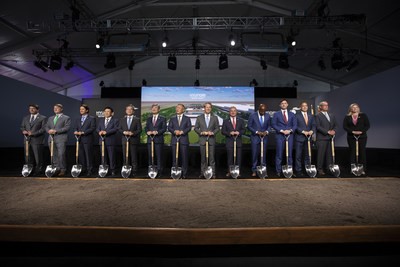Georgia governments and development authorities have increased their incentives to Hyundai Motor Group, but state officials were cagey in confirming the exact amount.
Last year, Hyundai announced it picked Georgia for its first fully dedicated electric vehicle and battery manufacturing facility. The company initially said it planned to invest more than $5.5 billion to build the facility, and LG Energy Solution subsequently announced it was a partner in the battery manufacturing facility.
In late August, Hyundai Motor Group and LG Energy Solution announced plans to invest an additional $2 billion in a battery cell manufacturing joint venture in Bryan County, prompting state officials to revise the incentives package.
Under the deal, Hyundai plans to spend roughly $7.6 billion on the facility in the 2,923-acre Bryan County Megasite along Interstate 16. Additionally, state officials said non-affiliated Hyundai suppliers plan to invest roughly $1 billion in the project.
State officials previously confirmed the deal included $1.8 billion in incentives. Under the revised deal, the company will likely receive millions of dollars in additional incentives.
"The only additional discretionary incentive offered by the state for this competitive project was a $2.75 million grant, which reflects the additional jobs being created and investment in the larger commitment by the company," the Georgia Department of Economic Development executive director of communications told The Center Square in an email. She did not respond to numerous requests from The Center Square to clarify incentive numbers.
The company could receive roughly $223.1 million in state income tax credits, up from about $212.6 million under the previous deal.
Hyundai received a 27-year property tax abatement and will begin making "leasehold ad valorem property tax payments" starting in 2026 after it completes the initial construction of its facility. State officials previously said Hyundai would pay more than $357 million during the period; now they say the total is more than $523 million.
Under the revised deal, officials increased the value of the Regional Economic Business Assistance grant---doled out in a pair of payments---from $50 million to $52.7 million. The money will help pay for site development, building or equipment purchases.
State officials said Georgia's Constitution does not allow direct cash grants to companies. So, state officials usually convey money into what they termed "project solutions to aid in speed-to-market for companies."
The new deal increased Georgia Department of Transportation funding for road improvements from $200 million to $210 million. The deal also calls for the state to pay $62.5 million for designing, building and furnishing a Quick Start Training Center and more than $24.8 million to operate it for five years.










Abby Andrews